The Breakfast Club at 40
A day in the life of an American teen by John Hughes
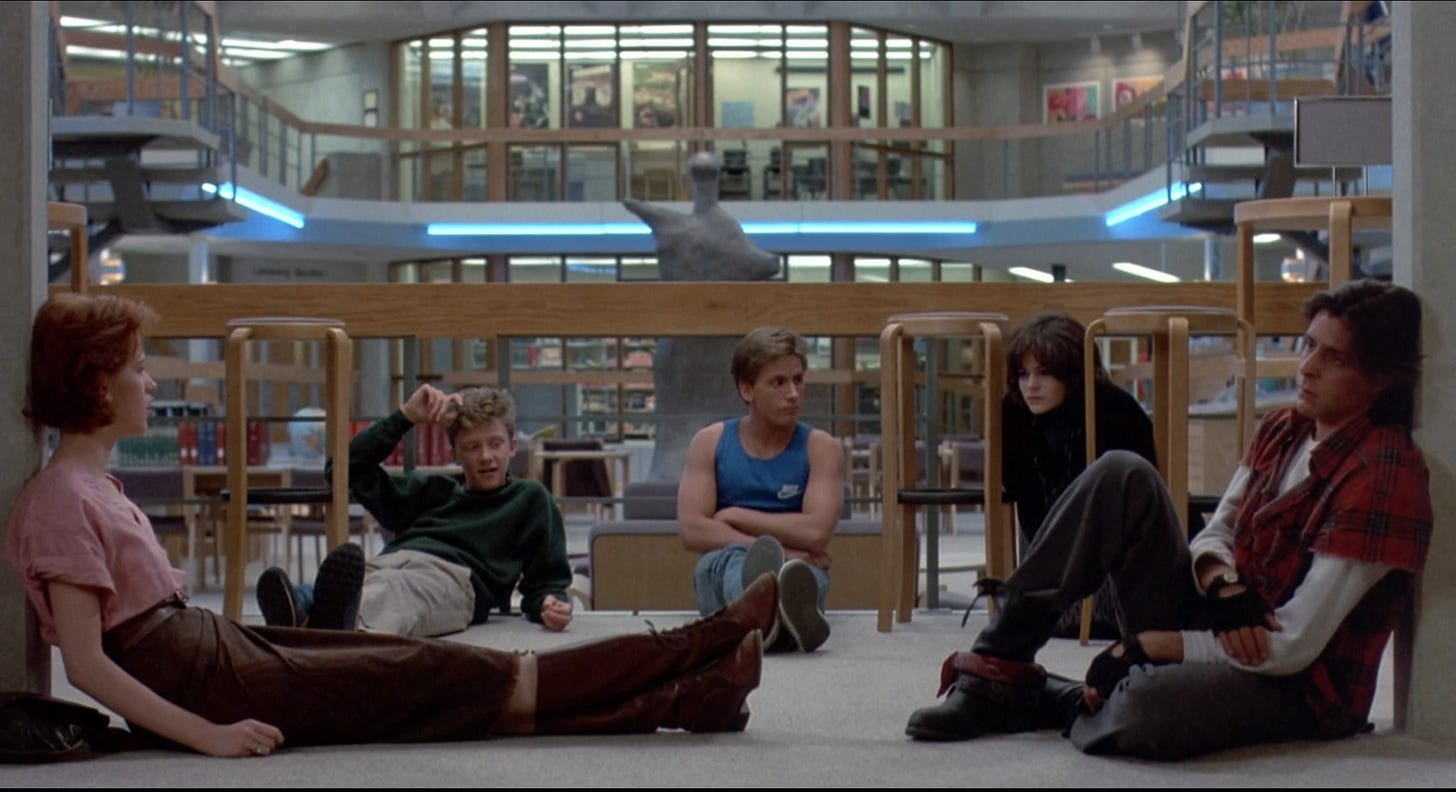
The late writer/ director/ producer John Hughes was born February 18, 1950 in Lansing, Michigan. He’d be celebrating his 75th birthday this month. Video Days kicks off its inaugural month with a retrospective of ten of the filmmaker’s pictures.
THE BREAKFAST CLUB (1985) is a formative film of the eighties largely because its filmmakers operate with no regard for what year it is. Referred to as “The Little Chill” by studio executives who disliked it and by critics who found it trendy, The Big Chill comments very specifically on Baby Boomers in 1983 and wouldn’t work any other way. With subtle changes to wardrobe, The Breakfast Club could take place in 1955, or present day, without missing a beat. Even in an era when films were defined by their soundtrack and immediately date stamped as a result, the music in this film does not. The result is something small, imperfect and timeless.
John Hughes dropped out of college and married his high school sweetheart at age 20, went to work for an advertising agency in Chicago shortly thereafter and by 24 had bought a house in the suburb of Northbrook. His neighbors assumed he was older than he was. By the time Hughes joined Leo Burnett & Company at 24, he was writing ad copy in the morning and humor pieces in the evening, ultimately getting one published in Playboy and later, National Lampoon. Expanding to screenplays, Hughes wrote so fast he was the sole credited writer on two comedies–National Lampoon’s Vacation and Mr. Mom–set to open the same month, July 1983. When Andrew Meyer, president of A&M Films, read the script for Vacation, he wanted to work with its author badly enough to fly to Chicago to meet him. Meyer was excited to learn that Hughes had a new script available, one he’d cranked out in two days over a holiday weekend, July 4-5, 1982. The piece was about five teenagers sentenced to Saturday detention together.
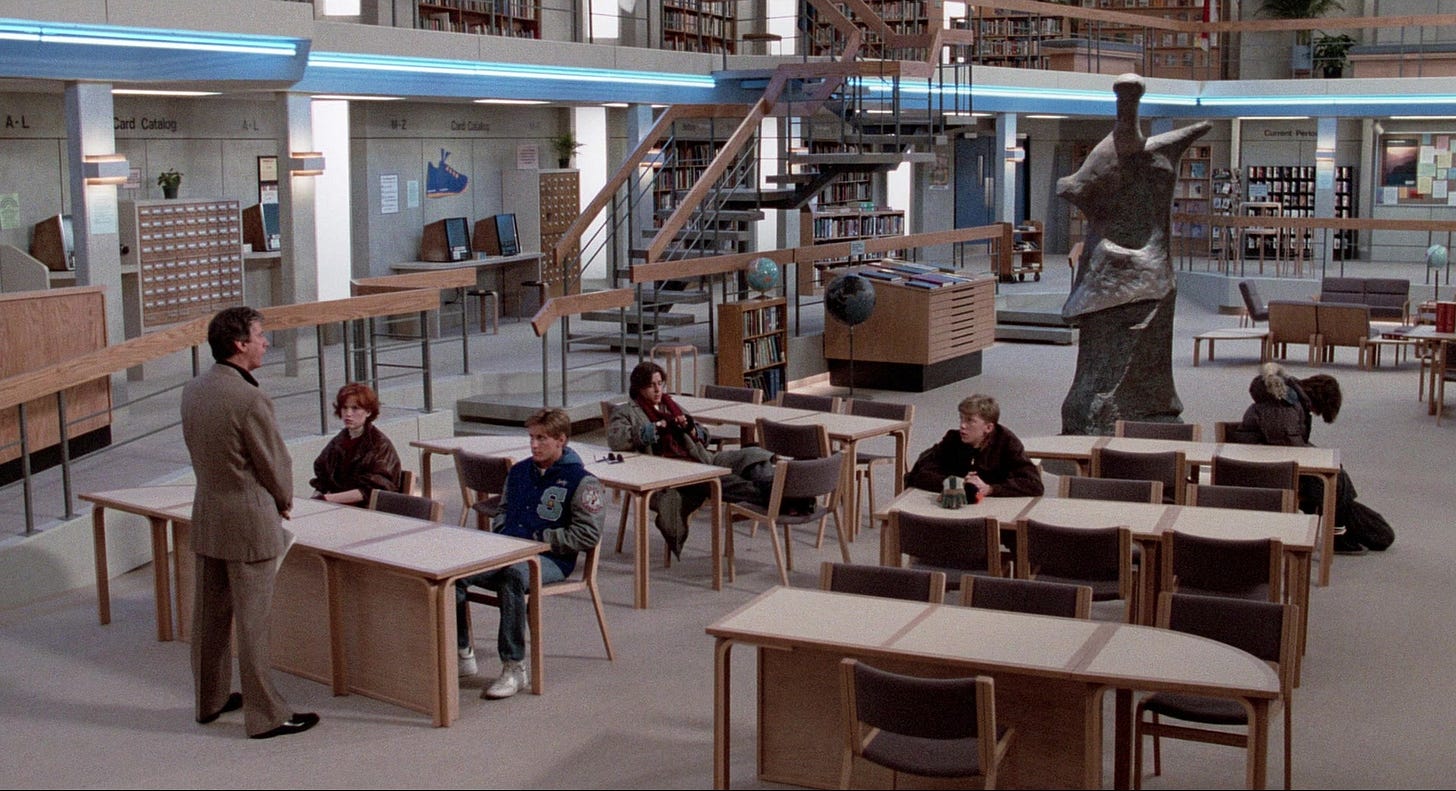
With the working title Detention, Hughes asked a friend’s son what students at his school, New Trier High in Winnetka, Illinois, were calling detention. Due to the time of day it convened on a regular school day, the teen’s answer was “the breakfast club.” Having learned through experience that screenwriters with authorial vision were marginalized, while film directors were not, Hughes told Meyer he’d written the piece with a single location and five main actors for the purpose of directing it himself. Even with a rookie attached as director, Meyer optioned the script. His plan was for the newly launched film division of A&M Records, which Gil Friesen served as chairman, to produce a $1 million version of Hughes’ script. In his surplus time, Hughes took a weekend to crank out a broad comedy titled Sixteen Candles (1984), penning the lead for an actor whose head shots he’d come across during the pre-production process for The Breakfast Club. Her name was Molly Ringwald.
Michelle Manning, the newly hired executive assistant of producer Ned Tanen, was asked if she knew of any good material. Knowing that Tanen—who’d resigned as president of Universal Pictures in December 1982 to launch his own company, Channel Productions—had supported first-time or unproven directors like George Lucas, John Landis and Amy Hecklering with youth-oriented films at Universal, Manning recommended John Hughes and Sixteen Candles. Tanen bought the script immediately, setting up financing and distribution at his former studio, with Hughes to make his directorial debut. Tanen had read The Breakfast Club and wanted to produce it as well, but suggested a comedy had a better shot at establishing Hughes as a film director than a drama that might play as a series of stage monologues. Hughes agreed. Though grossing a third of what Vacation and Mr. Mom had, Sixteen Candles was a niche market success, its director and actors not costing anything. Universal offered Hughes a three-year deal. Serving as producers, Tanen and Hughes gave A&M the opportunity to upgrade their planned $1 million production of The Breakfast Club to a $12 million version co-financed and distributed by Universal. Andrew Meyer and Gil Friesen retained executive producer credits on the film.
Hughes recruited Molly Ringwald and Anthony Michael Hall from Sixteen Candles, casting them as the Basket Case–the character Ringwald felt the most affinity with as a high school student herself–and the Brain. Ringwald had second thoughts, thinking the character of the Princess would be more challenging, and though casting director Jackie Burch thought it was a mistake, the actor switched roles. Ally Sheedy joined the cast as the Basket Case, followed by Emilio Estevez as the Athlete. To play the Criminal, the finalists were John Cusack and Judd Nelson. (Cusack, who Hughes had cast as a geek in Sixteen Candles, was perhaps the best actor, while Nelson was a better fit for the dangerous malcontent Hughes had written). Nelson won the part. Paul Gleason was cast as the heel, and as Carl the janitor, SCTV veteran Rick Moranis.
The production found a high school that had been recently built in the northwestern Chicago suburb of Des Plaines, and for lack of students, recently closed. Leasing the vacant Maine North High School gave the crew 24/7 access and the space to build production offices, editing facilities and a screening room in the former gymnasium, where they also constructed the library which serves as the film’s central set. Three weeks of rehearsals commenced there, but by the time the cast were being dropped off at real high schools in the area and told to mingle, Hughes felt their energy was peaking, and two and a half weeks into the rehearsal, in March 1984, he started shooting. Moranis, who’d booked supporting roles in three major films set for release in the coming weeks, had settled on playing his character as a Russian immigrant, with thick accent and as Ringwald remembered it, a Russian hat. After a day or two of shooting, Tanen stepped in on behalf of Hughes to tell Moranis they were moving in another direction. Chicago actor Tony Kapelos, another alumni of Sixteen Candles, took over the role of Carl.
Despite its bulk, filming of Hughes’ 165-page script was completed in 32 days. Like clockwork, his assembly clocked in at 165 minutes. Dede Allen, a master editor who cut Bonnie and Clyde (1967) and Dog Day Afternoon (1975), worked with Hughes to trim the excess. Carl’s scene with the breakfast club was shortened, dropping a section where he forecasts where each of them will be in ten years. The trip Allison Reynolds (Sheedy) and Andy Clark (Estevez) make to the teacher’s lounge for sodas was written and shot, Allison using a switchblade to crack open a locker to discover a Prince LP (She comments, “Do you know what this means? They’re human.”) When the breakfast club falls asleep, Allison studies them, imagining Claire Standish (Ringwald) as a bride, Brian Johnson (Hall) as an astronaut, Andy as a Viking and John Bender (Nelson) as a convict. When finished, The Breakfast Club ran 97 minutes.
Given the clock motif, Hughes heard a bass and drum heavy score, and hired Keith Forsey to compose the music. Forsey, a percussionist who’d played drums for Giorgio Moroder, had broken into films co-writing “Flashdance … What A Feeling” with Moroder and Irene Cara for Flashdance (1983), which won the Academy Award for Best Song. Forsey was invited to rehearsals in Des Plaines and returned to Los Angeles to work with guitarist Steve Schiff on music and lyrics for several songs, including “Don’t You (Forget About Me)”. Forsey & Schiff had the Glasgow band Simple Minds in mind to perform it. Signed to A&M Records, Simple Minds seemed like a done deal. Channel Productions executive Michelle Manning and music supervisor David Anderle flew to London, where the band passed on the job. Manning and Anderle pitched the song to other British artists, none of whom were interested. Chrissie Hynde agreed to perform the song, but pregnant, couldn’t fulfill obligations for the music video. She recommended her husband Jim Kerr, lead singer of Simple Minds. Kerr was not simply opposed to performing songs he hadn’t written, but wasn’t even a fan of the demo, which he didn’t think sounded much like Simple Minds. Pressed by their label, the band capitulated, and Anderle returned to London to produce the track. (Of all the Simple Minds singles released in the U.S., “Don’t You” became the one and only to reach #1 on the Billboard charts).
Screened for Universal executives, including chairman Frank Price, The Breakfast Club was met with silence. According to Ned Tanen, the studio didn’t feel the film had any story, or know how to sell it. To get an honest trailer out, Tanen and Hughes turned to the firm of Kanew-Manger-Deutch, which specialized in coming attractions and had cut the trailer for Sixteen Candles. Hughes was so pleased with their work that he hired a partner in the firm named Howard Deutch to direct Pretty In Pink (1986) and Some Kind of Wonderful (1987). Universal booked the film for a wide release on February 15, 1985—President’s Day weekend—in 1,071 theaters in the U.S. This was before the Simple Minds single would be in stores, negating its potential to help sell the movie. As it turned out, The Breakfast Club didn’t need the additional promotion. Its first five weekends in release, only Beverly Hills Cop (1984) and Witness (1985) sold more tickets. Chicago film critics Gene Siskel and Roger Ebert heralded it as a movie that took teenagers seriously. Instead of ensemble pieces being compared to The Big Chill, they started being compared to Hughes’ film. When Frank Price resigned from Universal in 1986, one of the successes credited to his regime was The Breakfast Club.
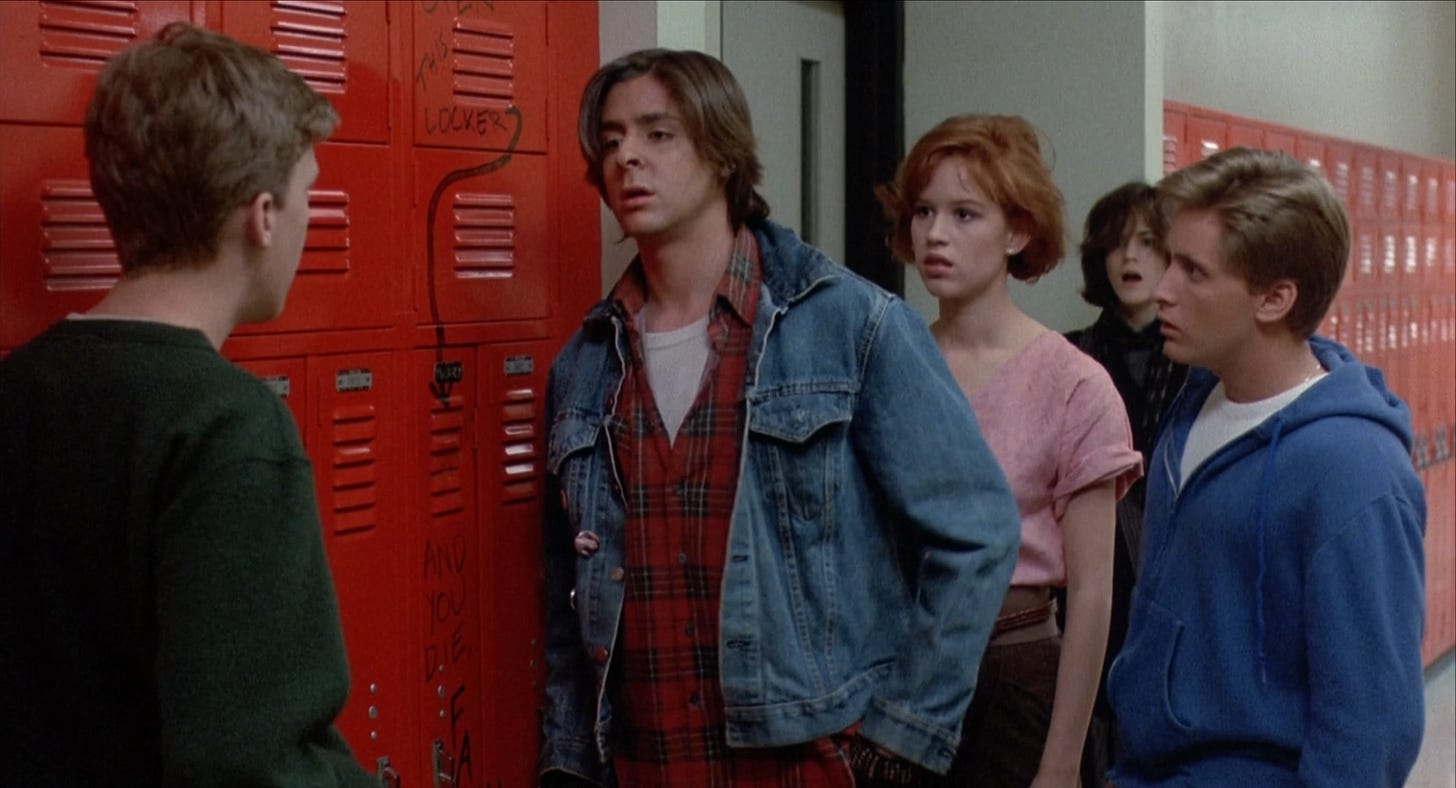
In a classic episode of The Twilight Zone written by Rod Serling and titled “Five Characters In Search of an Exit,” an army major wakes up in a cylindrical room with no windows or ceiling, where a ballerina, a clown, a cowboy and a bagpiper are interned with him. There’s good money on a TV connoisseur like John Hughes having seen this episode, but whether or not there’s a direct connection to The Breakfast Club–with five characters in search of an exit–it proves what a grounded basis in drama his film has. Everything we need to know about the characters of the Princess, Athlete, Brain, Criminal and Basket Case we understand by watching who, if anyone, drops them off for detention and how that hand-off goes. Details, like their meals or what they’re in for, are Hughes showing off how well he can write teenagers. Safe from the ridicule of their peers and with nothing better to do, detention gives them permission to talk to each other, and rather than drowning in their own problems, are exposed to someone else’s. While Hughes’ scripts are usually situation based, with jokes dangling on branches like Christmas ornaments, The Breakfast Club stands out by being location based. Because the characters can’t distract themselves the way they would in a variety of situations, they’re forced to address the unattractive things about themselves.
The A+ script meets B casting. Ringwald plays the same character she did in Sixteen Candles and by passing up the Basket Case for the Princess, got stuck playing a style-forward snob in her subsequent film work. Hall gives the performance of his career, stripped of cockiness and able to get laughs by simply being matter-of-fact and nakedly honest. Sheedy, a far more interesting actor than the girl-next-door roles offered in studio films like WarGames (1983) or Short Circuit (1986), also does her finest work. Estevez and Nelson are reliable anchors, they just don’t exhibit the “special” that Hall does, forecasting that geeks would take over the world. Tony Kapelos is what every janitor should be–invisible–and the decision to replace Rick Moranis averted disaster, keeping the focus on the teenagers. The soundtrack doesn’t overpower them either, with one song–”Don’t You (Forget About Me)” performed by Simple Minds--standing out and tailored perfectly for the film’s best qualities: introspection and self-respect. The Breakfast Club is not just a classic ensemble film, but a great film that unwinds in a 24-hour time frame, with characters so vivid we can entertain ourselves wondering what their tomorrow and especially their Monday back at school will look like.
Video rental category: Drama
Special interest: 24-Hour Time Frame


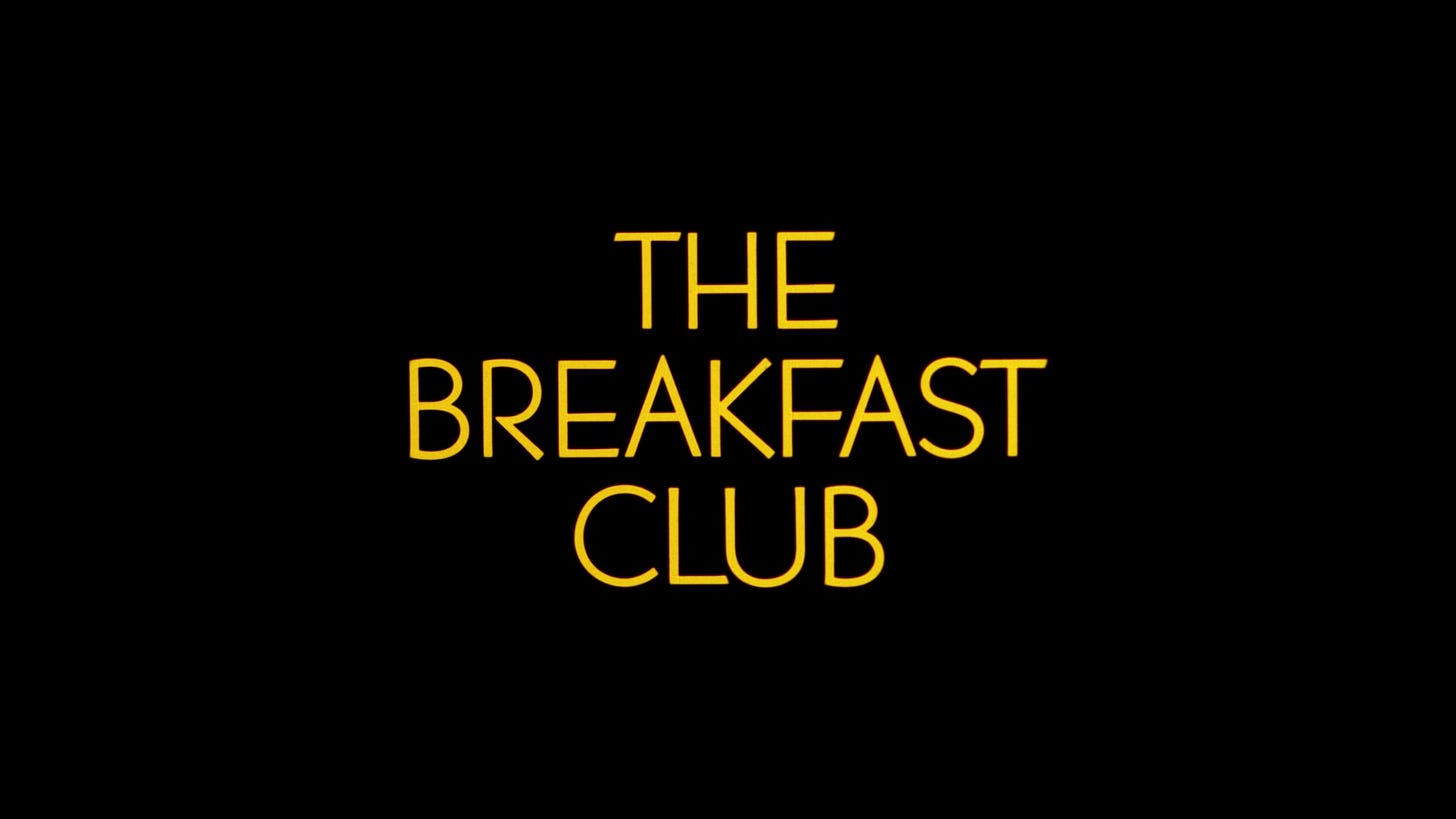
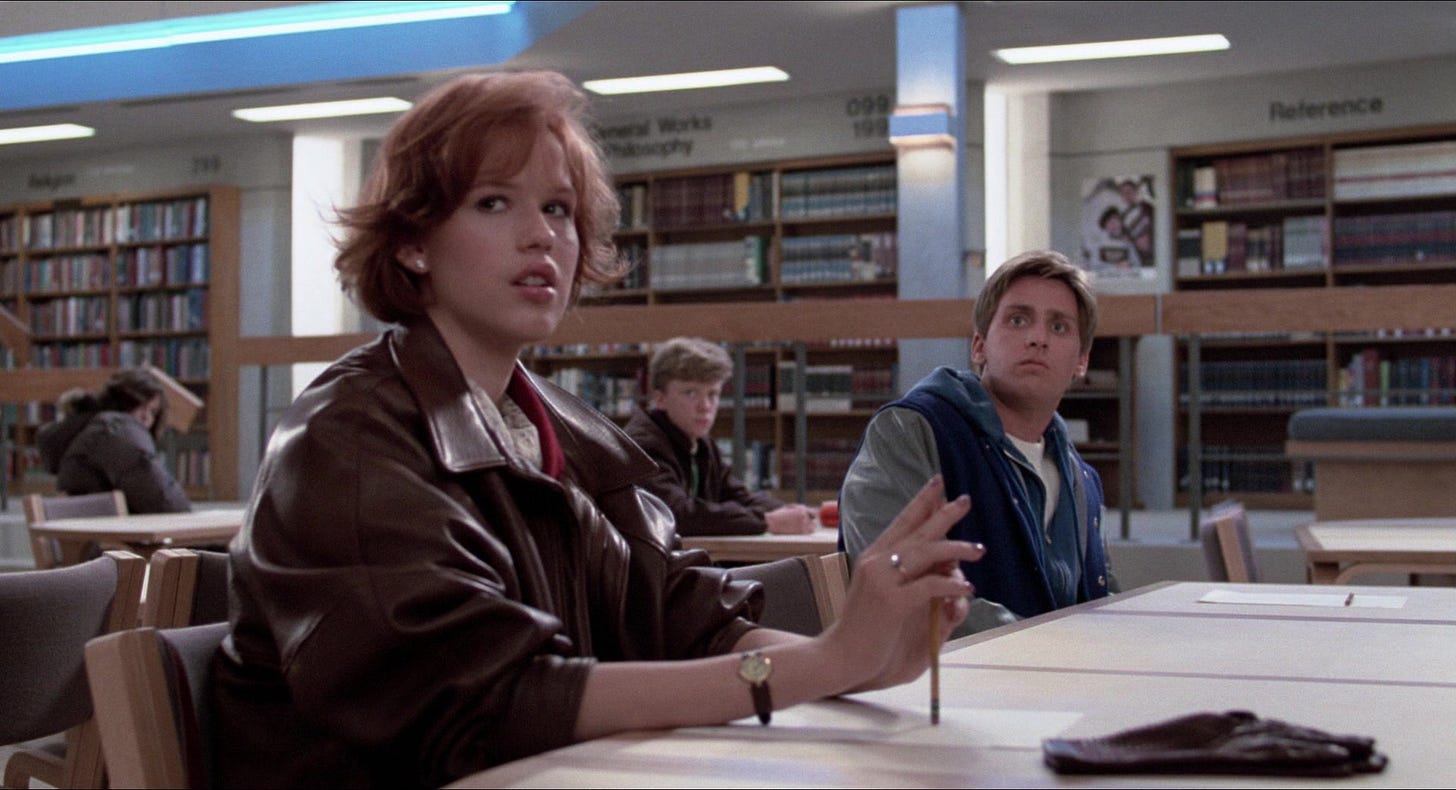
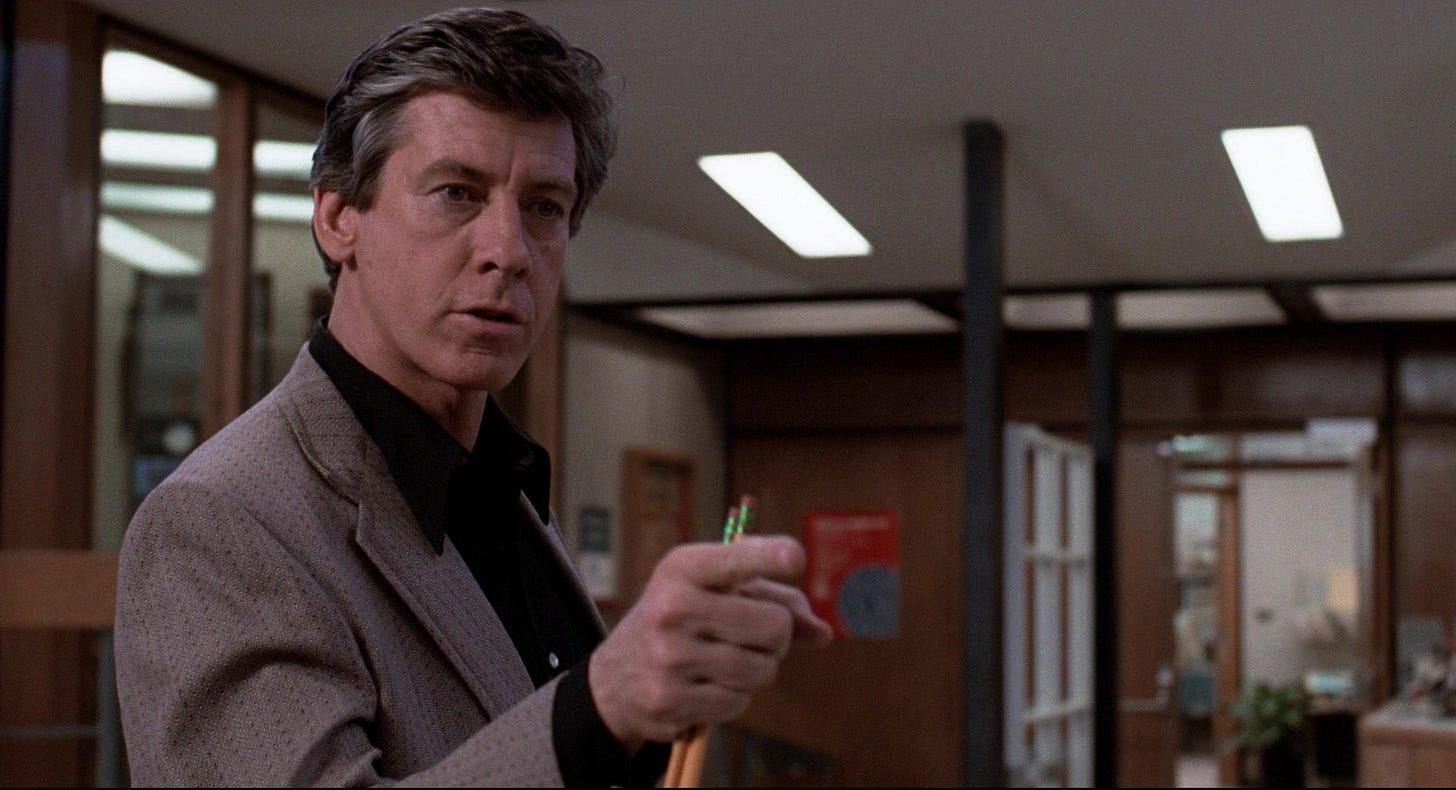
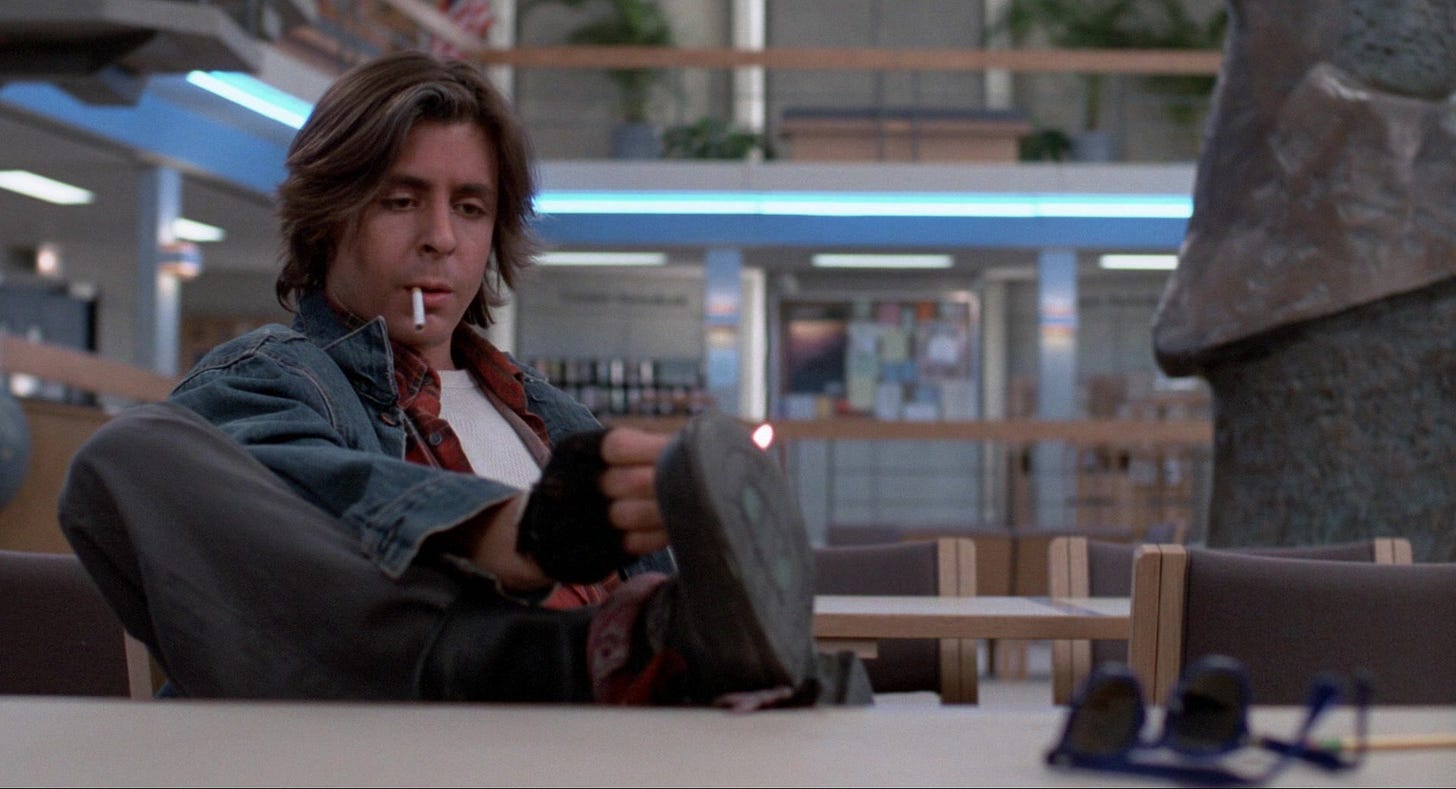
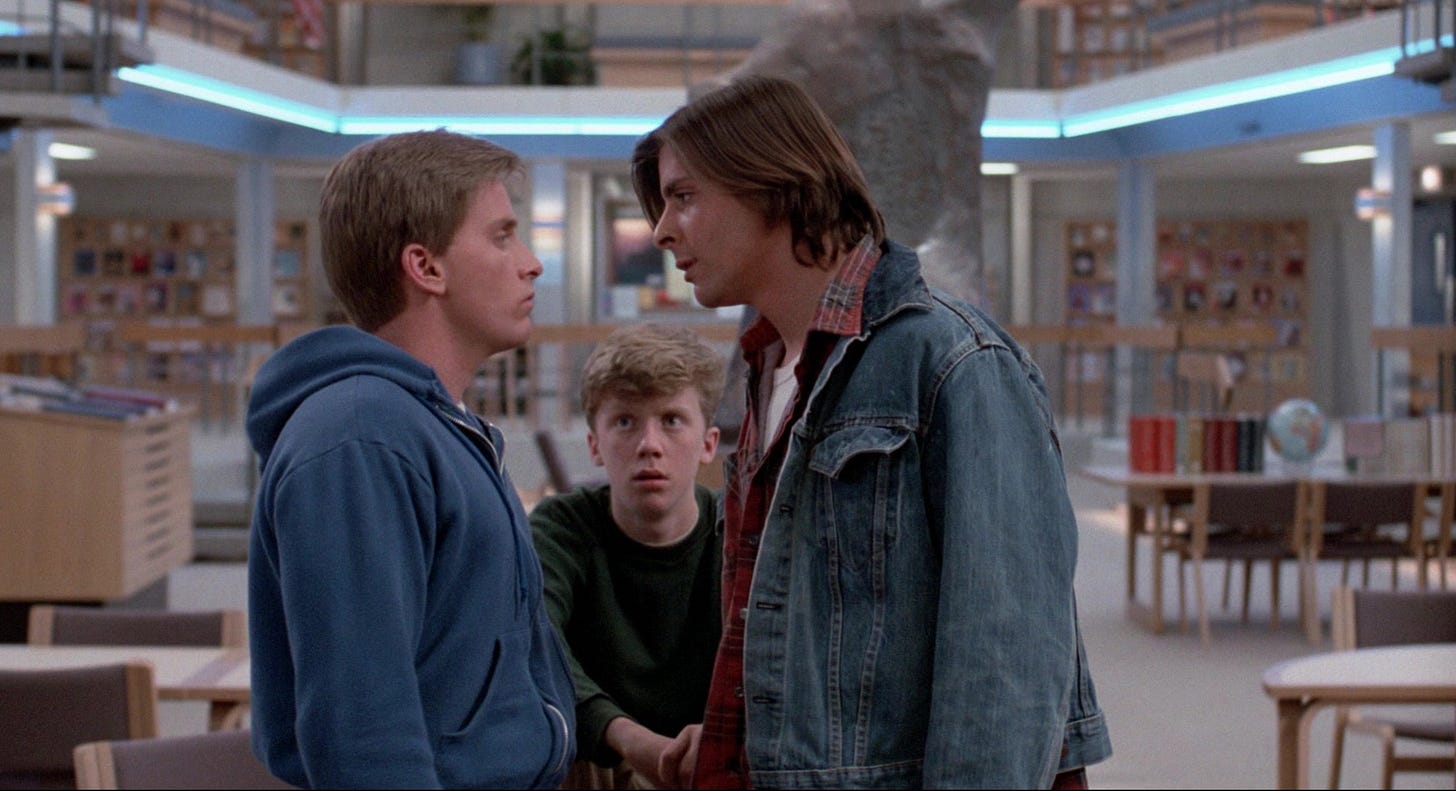
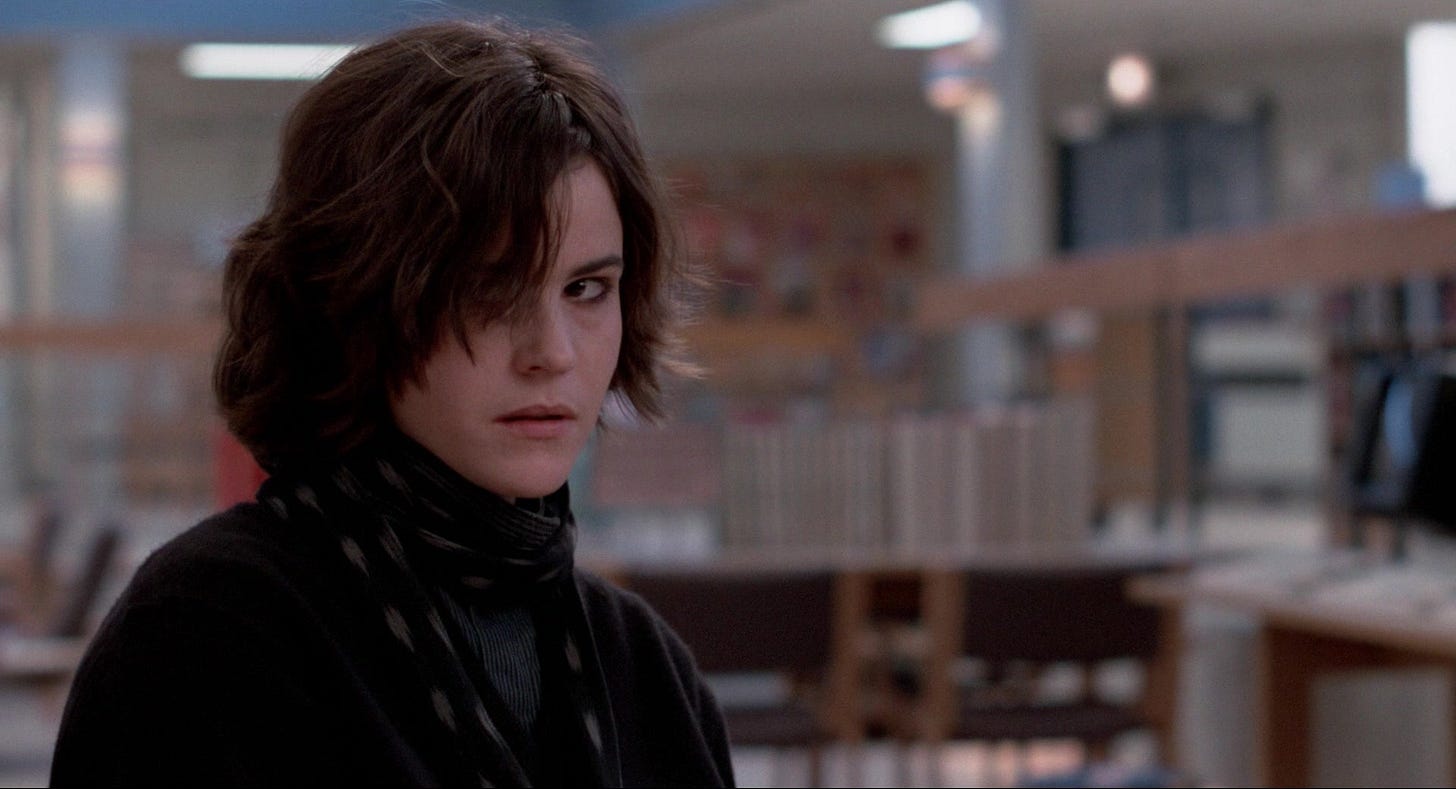
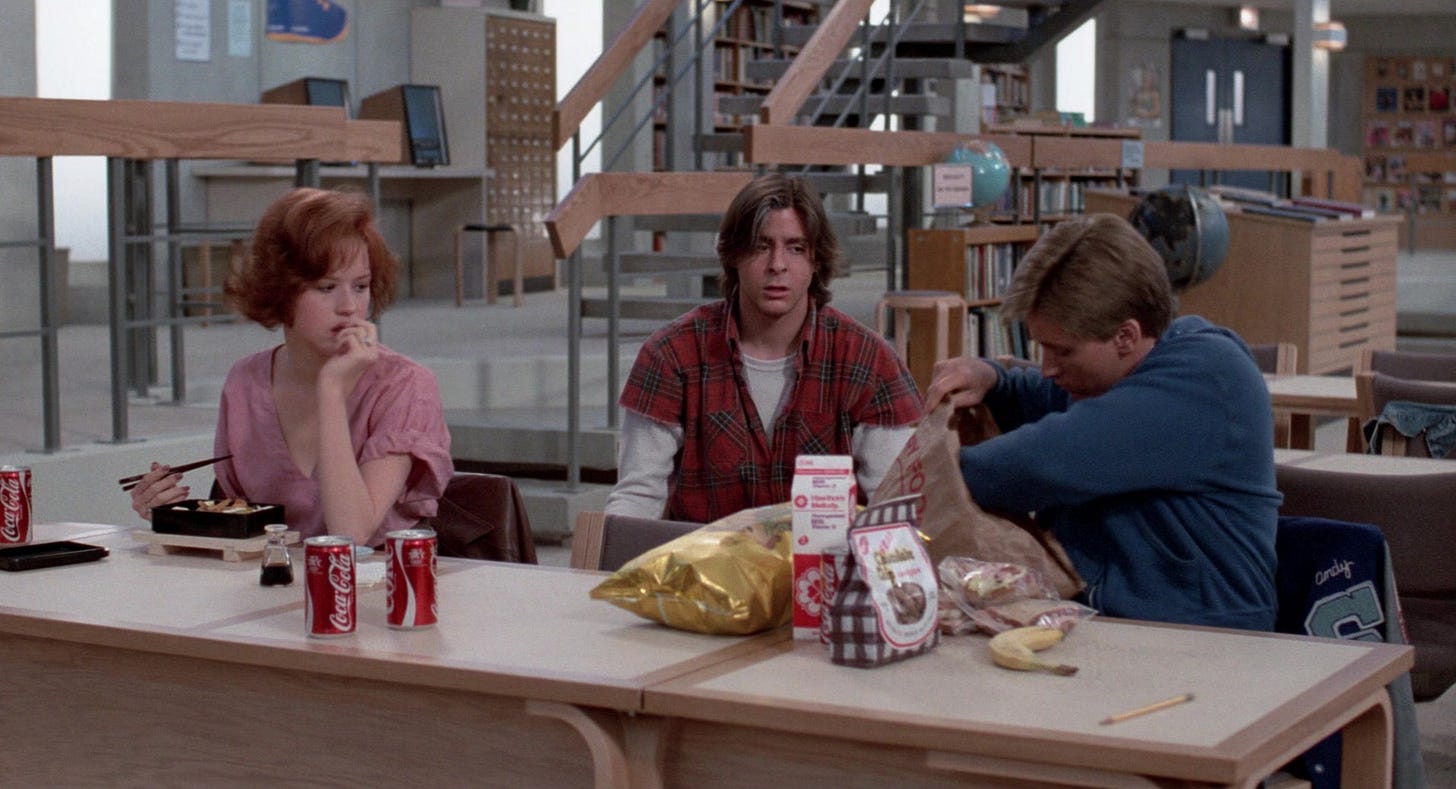
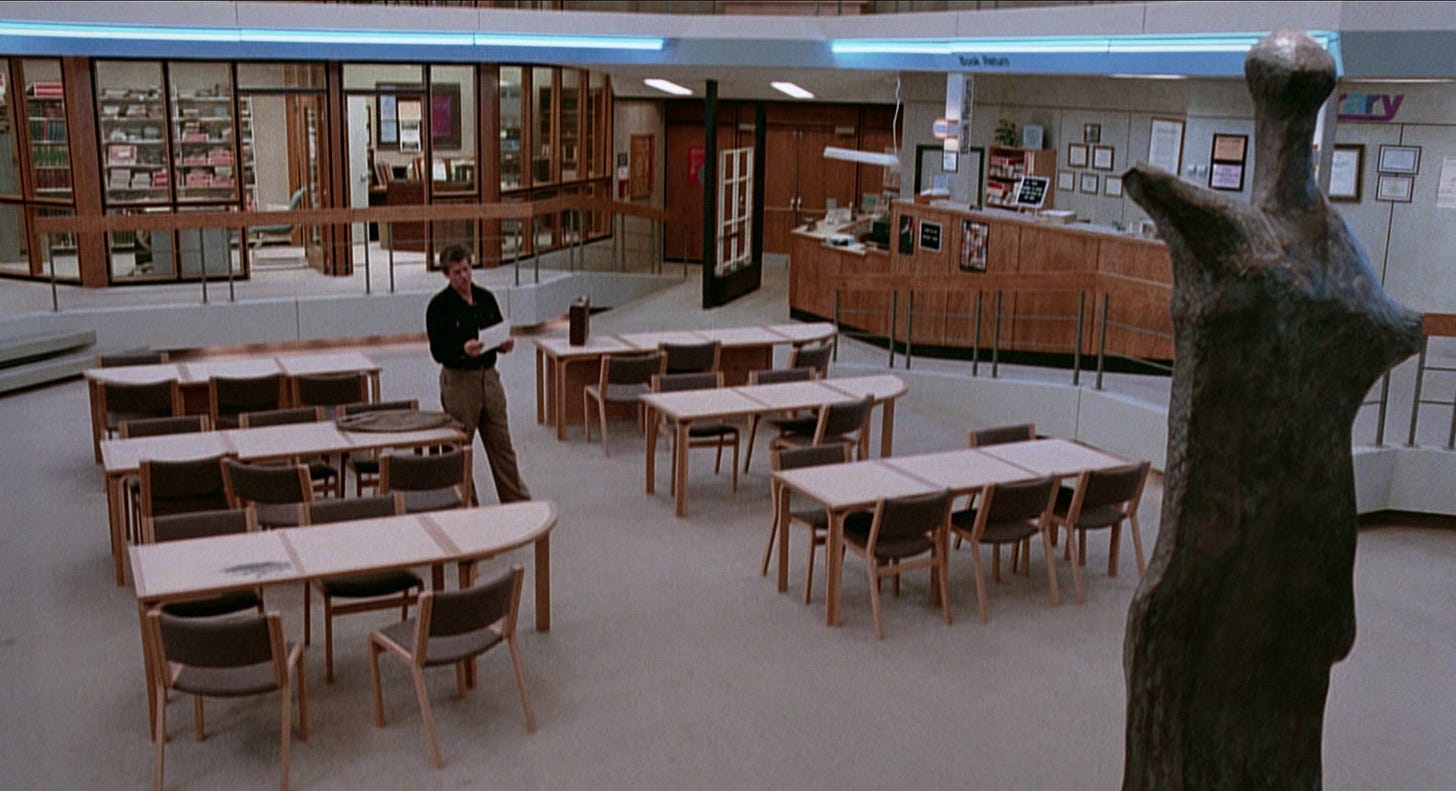
Wow, that number of different sources you use is impressive! Kudos!
Excellent commentary, Joe!
Where do you get the background information on these films? It's really interesting!